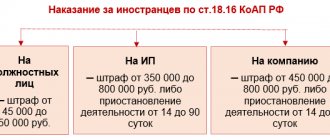There is no special law that contains all the rules. Therefore, to work online, you need to comply with both the usual trade legislation and special rules developed specifically for distance selling.
We tell you what needs to be taken into account in order for the online store to operate without complaints from the tax authorities, Roskomnadzor, Rospotrebnadzor and other inspection bodies.
- What is an online store
- Legal form and tax regime
- Basic consumer rights
- Features of returning goods during distance selling
- Responsibility for violation of consumer rights
- Comply with personal data laws
- Do not violate copyright
- What to do with cash registers and receipts
- Product labeling
- What is prohibited from selling on the Internet
- New rules for online trading from 2021
What is an online store
An online store is a demonstration of goods on online resources, accepting orders for them, selling and organizing delivery to the buyer, for example, to a pickup point. A detailed definition is in clause 57 of GOST R 51303-2013.
An online store is considered not only a separate website, but also a group on a social network or an Instagram profile if the buyer can select a product from them and order it.
The operation of online stores is regulated by several laws:
- Those that are suitable for regular stores and business in general. For example, relationships with clients need to be built in accordance with the Law “On Protection of Consumer Rights”.
- Special regulations that regulate the activities of online stores. For example, “Rules for the sale of goods under a retail purchase and sale agreement...” The previously valid “Rules for the sale of goods by remote means” have become invalid as of January 1, 2021.
An online store will be considered any business that sells goods remotely via the Internet. For example, you may have an offline outlet and a group on a social network - from the point of view of the law, these are two stores, regular and remote.
An online store usually means trading with individuals. Work with businesses is regulated by the Civil Code and contractual relations; the Law on the Protection of Consumer Rights does not apply.
Concept
Distance trading is a method of retail sales of goods in which there is no personal contact between the seller and the buyer.
Attention! If you have any questions, you can chat for free with a lawyer at the bottom of the screen or call Moscow; Saint Petersburg; Free call for all of Russia.
For your information
In Russian legislation, only the sale of consumer products is considered distance selling. The sale of items for business activities without contact between the seller and the buyer is not considered distance selling.
Legal form and tax regime
Even if you decide not to make your own website, but to start trading through a community on social networks, you need to comply with the requirements of the law and pay taxes. To do this, inform the tax office about opening a business, select the legal status and form of taxation.
There are several options.
Register as self-employed
This is the easiest way - just download the “My Tax” application and get a new status using a photo and passport. The turnover limit is RUB 2.4 million. in year. There is no reporting. You need to issue receipts through the app, and it's free. Tax - 4% on sales to individuals, 6% from legal entities. You can only sell goods of your own production; resale is not allowed. It is still not possible to sell excisable goods and goods that require labeling.
Read the article: What self-employed people can count on: new opportunities in 2021
Register as an individual entrepreneur
Documents for registration of individual entrepreneurs can be submitted on the Federal Tax Service website, through the mobile application “Personal Account of an Entrepreneur” or on the government services portal. There are several tax systems, you need to choose one. For an online store, the simplified tax system is usually used - either “income” with a tax of 6% on all revenue, or “income minus expenses” with a tax of 15% of profit.
Online accounting for self-employed entrepreneurs
For individual entrepreneurs on a simplified basis, the turnover limit per year is 150 million rubles. You cannot hire more than 100 employees. You need to pay contributions to the Pension Fund and the Compulsory Medical Insurance Fund, in 2021 this is 40,874 rubles. plus 1% above income of 300,000 rubles. Individual entrepreneur submits tax reports.
Read the article: How to open an individual entrepreneur in 2021: step-by-step instructions
Open an LLC
Unlike an individual entrepreneur, a business in an LLC can be owned by several participants - for example, you and a friend open an online store. An LLC can also use the simplified tax system, with the same restrictions as an individual entrepreneur. To open an LLC, you need authorized capital and constituent documents, and you are required to submit accounting and tax reports.
Read the article: Registering an LLC: step-by-step instructions
If an online store operates without registration, the tax office may come to you with an audit - for example, based on a buyer’s complaint. Here's what you're facing:
- The fine for illegal business activities is from 500 to 2,000 rubles. (Article 14.1 of the Code of Administrative Offenses of the Russian Federation).
- Criminal liability if large income is received. From April 12, 2021, the amount of large and especially large damages is determined only in the absolute amount of unpaid taxes (Federal Law No. 73-FZ dated April 1, 2020). Fine - 300,000 rubles, salary or other income of the offender for two years, compulsory labor or arrest for up to six months.
- Your products and equipment with which you conducted your business may be confiscated.
- The Federal Tax Service will also collect unpaid taxes. It is usually assumed that you worked under the general taxation system, that is, you will have to pay 20% VAT and additional contributions.
Nuances
When opening a store that trades remotely, it is advisable to use a simplified taxation system. When working through OSN, when the seller pays taxes in full, the cost of accountants' services will significantly reduce profits. The simplified tax system is not only a tax reduction, but also reduced accounting requirements. Most stores that sell goods online meet the requirements necessary to connect to the simplified tax system. When choosing the simplified tax system, an enterprise is exempt from income tax, VAT and property.
For your information
At the first stages of the enterprise’s operation, you can not register a legal entity, but limit yourself to registering with the Tax Service as an individual entrepreneur.
Comments Showing 0 of 0
Basic consumer rights
An online store client is a consumer who has the right to purchase a quality product. This product must comply with GOSTs and other mandatory requirements, if any.
In addition, the consumer has the right to receive truthful information about the product and, even before purchasing, to familiarize himself with the terms of ordering, payment and delivery.
Add a public offer agreement to the website
This is an agreement with users in which you agree in advance on the conditions and procedure for concluding a purchase and sale agreement (Article 494 of the Civil Code of the Russian Federation). Such an agreement does not need to be signed - the public offer may indicate that if the user purchases the product, he automatically agrees to this offer.
The content of the offer cannot contradict the law. Typically, the offer is placed in the user agreement - the client agrees to accept it during the process of registering an account or making a purchase. The offer can also be posted in a group on a social network, the main thing is that the document is visible and accessible to all buyers.
The content of the offer includes the procedure for ordering goods and paying for it, delivery conditions, the procedure for receiving discounts and participating in promotions, the procedure for returning money and other information regulating the interaction between the buyer and the store.
Fill out the product card in detail
The description of each product must be accurate. You cannot sell a yellow dress and bring a blue one to the buyer. Usually they indicate the type of product, article number or model, if any, a description of the specific product, its characteristics, country of manufacturer, price, expiration date.
Follow the ordering requirements
When checking out, the buyer must provide the name and address of the online store, indicate the name of the order recipient and the delivery address. Add to the information the name of the product, its article number, brand, price, set and number of units. Please also indicate the delivery time.
Typically, all information is published on a separate page of the website - the buyer sees it before proceeding to payment. Or they add all the data to the public offer - then you need to write what user action will be considered confirmation of the order. For example, clicking the “I agree” button.
Follow the delivery terms
You are obliged to deliver the goods to a pre-agreed place and time (clause 20 of the “Rules for the sale of goods under a retail purchase and sale agreement...”)
Describe on the website the delivery methods and the price for each of them. If the goods could not be delivered due to the fault of the buyer, the store has the right to agree on a new delivery date, under the conditions stipulated in the retail purchase and sale agreement. It is also better to place this condition in the offer.
Are returns always made?
No not always. To get your money or other product back, the buyer must meet all of these conditions:
- preserve the appearance and consumer properties of the product - not the packaging, but the appearance. For example, worn clothes cannot be returned. A non-working vacuum cleaner, if it was the buyer who broke it, cannot be returned either. Although some unscrupulous buyers regularly try to do this;
- keep all labels and tags on the product;
- keep other documents confirming the fact of purchase: receipts, invoices, and so on.
If at least one of these conditions is not met, you have every right to refuse the buyer a refund or other replacement product. The only exception is if the buyer does not have a receipt. In this case, he must present witnesses who will confirm the fact of the purchase.
Important! Unlike retail stores, which have a list of items that cannot be returned, online stores do not yet have this. That is, theoretically, you can return everything: underwear, cosmetics, and personal hygiene items.
Also important! But if the product was made specifically for the buyer in a single copy - designer clothing, exclusive jewelry, it cannot be returned - if only because no one else will be able to use it.
Return of underwear
Features of returning goods during distance selling
The process depends on whether the buyer is returning a quality product or a defective one.
Return of quality goods
The buyer of the online store can refuse the transaction and demand the money back at any time before receiving the goods and within 7 days after. If you do not specify the return procedure on the website, the period increases to three months. The process is regulated by Art. 26.1 of the “Law on the Protection of Consumer Rights”.
The buyer can return a quality product only if it remains in its original condition. If the buyer does not have a receipt, this does not mean that he can be refused.
There is an exception to the rule: the buyer cannot refuse a quality product if only he can use this product. Simply put, if a person bought a jacket made to an individual design and size, he cannot refuse it. If he bought ordinary mass-produced clothing, then if it remains in good condition, he can return it.
The seller must return the money within 10 days after submitting the claim. Shipping costs from the consumer back to the store are usually deducted from the refund amount.
Return of low-quality goods
The rules for returning goods with defects in online stores are the same as in regular stores. If the buyer discovers a defect, he can demand replacement of the product with the same or similar one, a discount commensurate with the defect, compensation for repairs from a third party, repair or a refund.
To find out who is to blame for the defect, an independent examination can be done. If the defect arose due to the actions of the buyer, he is refused. You can also try to reimburse the costs of the examination.
If the defect appears due to the fault of the store or manufacturer, then the store must satisfy the buyer’s requirement. The buyer's complaint must be responded to within 10 days.
Distance selling guarantee
Goods sold remotely are subject to the same government guarantees as goods sold through regular retail stores. Russian legislation obliges the seller to provide as complete information as possible about the product being sold. If the buyer purchases a complex technical device, all documentation must be attached to it, and it is also subject to the same guarantees as other similar goods.
Buying goods online today is not dangerous. In conditions of great competition, stores are trying to create a stable and loyal group of customers who are ready to order goods from them on an ongoing basis. But if you encounter a low-quality product or poor service, you can write to the store’s technical support. They usually give out replacements easily. Do not rush to threaten the store with administrative sanctions and court; today’s services for purchasing goods via the Internet try to be as loyal as possible to dissatisfied customers.
Responsibility for violation of consumer rights
There are three types of liability: civil, administrative and criminal.
Civil law
Occurs in case of refusal to return a low-quality or high-quality product, deception of the buyer, problems with service, for example, with delivery. The buyer approaches the store with a claim, if he is refused or ignored, he goes to court.
Depending on the court's decision, here's what you'll have to pay for:
- reimbursement of the cost of goods;
- compensation for the costs of an independent examination;
- losses, for example, for damage to other property due to poor quality goods;
- moral damage - an amount agreed upon or by a court decision;
- penalties for violation of deadlines - for example, for returning money, this is 1% of the price of the goods per day;
- fine in favor of the client - half of the awarded amount if the store refused to voluntarily solve the problem.
Total civil liability may exceed several times the amount of goods sold.
Administrative
Occurs if the client complains to Rospotrebnadzor, tax or other regulatory authorities.
There are many options for fines:
- deceiving the client about the properties of the product - 3,000 - 5,000 rubles. for individual entrepreneurs and 100,000 - 500,000 rubles. for LLC;
- no information about the product, manufacturer, seller, operating mode - 5,000 - 10,000 rubles. for LLC;
- the product does not correspond to the description, for example, a different weight - up to 5,000 rubles. for individual entrepreneurs and up to 50,000 rubles. for LLC.
Criminal
The case is being initiated for trading in violation of safety requirements and forgery of quality documents. This usually occurs if the seller's actions resulted in injury or death. Punishment: up to 10 years in prison.
Comply with personal data laws
Personal data is information that allows you to identify a person. For example, full name, contact details, home address. When you transact with a customer, you receive, process and store this data. According to Federal Law No. 152 of July 27, 2006, an online store cannot do this without the explicit consent of the buyer.
To obtain the client's permission and warn him about the processing of data, post a privacy policy on the website.
The document must indicate the list of personal data that you collect and explain why you are doing this. For example, to execute a sales contract or to send advertising messages. It is necessary to add a storage period for data, talk about data protection measures - for example, encryption.
State in the policy what action will be considered the user’s consent to it - for example, clicking on the “I agree” button when registering an account.
If you do not comply with the law, you will have to pay a fine under Art. 13.11 Code of Administrative Offences. For example, for the absence of a policy on the site, 5,000 - 10,000 rubles. for individual entrepreneurs or 15,000 - 30,000 rubles. for LLC. For collecting and processing data without consent, an individual entrepreneur will pay 10,000 - 20,000, and an LLC - 15,000 - 75,000 rubles.
You also need to notify Roskomnadzor about the start of collecting personal data. If this is not done, the business will be fined under Art. 19.7 of the Code of Administrative Offenses of the Russian Federation: individual entrepreneur - up to 500 rubles, LLC - up to 5,000 rubles. You can only store personal data in Russia - check where your hoster’s servers are located.
Form of notification about the processing of personal data
Find out whether your site collects and stores data about user visits to the resource. This can be found out from the developers, in the CMS specification or in the terms of use agreement if you created the site using a website builder.
If so, set up a notification for all new users. They usually use a pop-up window asking for consent to use cookies (this is the name of the data collection technology). And add information about this to your privacy policy.
Do not violate copyright
All content has copyright. You cannot find photographs, product descriptions and logos of other companies in a search and then place them in your online store. You can be sued for copyright infringement - fines reach millions of rubles for one violation.
Here's what to do to avoid problems:
- Create your own content - hire a copywriter for product descriptions, a photographer to photograph objects.
- If you use someone else's content, be sure to obtain the author's documented consent to do so.
- Content marked with a free commercial use license does not require permission. Information about such a license is usually posted on the page where you can download it.
- If the text and photographs of goods on the site are created by your employee or contractor, enter into an agreement with him on the transfer of exclusive rights to use this content.
Detailed information about copyrights and their use is available in Section VII of the Civil Code of the Russian Federation.
Distance trade of medicines
Russian legislation allows remote trading of medicines. On October 13, 2017, the Government of the Russian Federation reviewed a bill previously submitted for discussion by the Ministry of Health.
The adopted act allowed the sale of medicines via the Internet. At the same time, new restrictions were introduced on the trade in medicines. The government has banned the sale of prescription drugs remotely. For organizations selling drugs online, a number of information was described that an online pharmacy must indicate on its website:
- Full name of the organization.
- Information about the registration address of the legal entity, as well as TIN and OGRN.
- A scanned copy of the license for the sale of medicinal products.
- Schedule.
- Information about the service responsible for receiving orders for the purchase of medicines.
What to do with cash registers and receipts
An online store must use cash register systems regardless of the payment method: cash, bank cards or electronic means of payment. If your online store sells goods, then you need to issue a receipt to the buyer within one business day after payment or at the time of transfer of the goods, whichever comes first. According to clause 5.3 of Art. 1.2 of Federal Law No. 54 of May 22, 2003, you can send it to the client’s email or phone.
Who exactly generates this check depends on the delivery format and type of payment.
Payment on the website: by card or electronic money
They usually connect using an agreement with a bank or through special services (Yandex.Kassa, Robokassa or PayPal).
Automate the accounting of goods from delivery to sale, keep track of balances. The service is suitable for any store
Try for free
You need an online cash register that can integrate with the service. After the transaction, the cash register itself will generate a check and send it to the buyer.
Payment to the courier upon meeting
If the courier is yours, then there are two options.
- You can give him a portable cash register, then he will punch the receipt immediately after payment and give the buyer a paper copy.
- Or do without it, and generate checks online and send them by email.
If you use the services of a third-party delivery service, then the receipts must be punched by their couriers. To do this, enter into an agency agreement with them for delivery and receipt of money from your buyer. Carefully study the document - it should contain a clause about the transfer of checks to the buyer. If it is not there, then the responsibility for this remains with you.
Payment by payment at a bank or via Internet banking
This is true for small stores. You need to punch a check if you are selling to individuals; for payment from an individual entrepreneur or LLC, a cash register is not required.
You generate a check at the cash desk and transfer it in any convenient way. For example, you can send it by email or SMS.
Payment by cash on delivery by mail
The buyer gives the money to the post office, and it will transfer it to your bank account. You don’t need receipts and cash in this format - the post office will do everything.
Special rules for the self-employed
They are required to issue customers a receipt generated in the “My Tax” application or in their personal account on the Federal Tax Service website.
Read the article: How to work with a cash register if you sell goods and services online
Tell the buyer about the return policy
It’s not enough to just come up with return rules and publish them on the website. By law, you must convey this information to the buyer - and not just tell it, but present it in writing. For example, send the buyer an email or print the information on a receipt or delivery note. If the goods are delivered by courier service, let the courier read the written information against signature. Draw up this paper in two copies - one will remain with the buyer, and the other with you. In the event of a return and possible litigation, this paper will serve as proof that the buyer was notified of the rules for returning goods in person.
Important! In the case of courier delivery, the ideal option would be to draw up a transfer and acceptance certificate right at the moment the goods are transferred to the buyer. Check the goods together with the buyer for defects and record the inspection data in the document. If you find any shortcomings, be sure to inform the buyer about them and ask about his further actions. He can immediately refuse the goods, or he can sign that he has no complaints. If he subsequently changes his decision, the paper will protect you and become evidence in your favor in legal disputes.
Remember, the most important thing is not to fight with the buyer, but to try to carry out the work as efficiently as possible. Build trusting relationships with clients, avoid conflicts and disputes, comply with all legal provisions and follow established rules. Good luck with your trading!
Product labeling
Labeling is the application of a special image, similar to a QR code, to a product. Each code is unique - this is how the authorities plan to track the movement of goods at all stages, from the manufacturer to the final consumer. And consumers will be able to make sure that a particular product is not a fake.
According to the authorities, by 2024 all goods should be labeled. Now mandatory labeling is being gradually introduced for different types of goods. For example, in 2021 it was necessary to mark shoes, tires, bedding and cameras. From January 1, 2021, manufacturers must release already marked clothing. By February 1, stores must independently label all clothing purchased before January 1.
Automate your work with labeling along the entire chain of your business processes
Keep track of the current list of goods that need to be marked on the website of the Honest SIGN system. If you sell products from categories that are required for labeling, you need to transfer data about this to the system. The process looks like this:
- When the goods arrive at the warehouse, you need to check them for markings and compliance with the codes in the invoice. Then scan the codes and enter them into the product database, transferring the information to the Honest ZNAK system. The code scanner must be connected to the online cash register.
- If the buyer pays online, you must give him two receipts - the first, without markings, after transferring money, the second, with markings, along with the goods from the warehouse.
- If you pay upon receipt, then there will be one receipt - you scan the marking code, accept payment and hand over the goods.
In order not to violate the law on markings, you need to register in the Honest ZNAK system before starting work. You can do this in advance, even if your products are not yet required labeling. To work with the system, you will need an electronic signature and a modernized online cash register. You will have to purchase a device for scanning marking codes and connect an electronic document management system.
Read the article: Sales of labeled shoes and clothing through an online store: key rules
If you issue checks without a marking code, you can receive a fine for incorrectly generating a cash receipt: 1,500 - 3,000 rubles. for officials, 5,000 - 10,000 rubles. for legal entities.
Comprehensive solutions for working with labeled goods that are suitable for online stores are available here - Kontur.Marking.
How to protect yourself from returns
1. We read the law and carefully follow all the points: we indicate a detailed description of the product on the website, photograph it from all sides, shoot a video, talk about its properties and functions. This is necessary in order to eliminate the buyer’s doubts and reduce the number of returns of goods of proper quality - simply because you did not describe it well enough.
2. We find good, proven suppliers and purchase only really high-quality goods. This is necessary in order not to earn a reputation as a store with low-quality goods and to reduce to a minimum the sale of goods with defects and shortcomings.
3. We are developing a regulation on the return of goods. While the law does not stipulate strict requirements for returns, each store draws them up independently. We advise you to write down the basic provisions, terms and procedure for returns, a warning to buyers to maintain the integrity of the packaging and presentation, receipts and documents, as well as your own conditions. We advise you to include in the rules such items as making a return only upon presentation of passport or contact information, filling out a return form - in short, any formalities. This is necessary in order to scare away scammers who made returns in online stores as a way to make money. We wrote in more detail in the article about how to recognize a fraudulent buyer.
Requested documents when returning goods
Also, write in the rules in a separate paragraph that you are not responsible for the actions of the transport company - if due to their fault the goods are damaged on the road, they must return the money.
4. Pay attention to alarm bells. You should be concerned if a person:
- takes a very long time and scrupulously to clarify the functions and composition of the product;
- does not want to leave contact information for communication;
- names an account or card number that belongs to another person.
Of course, you won’t be able to completely eliminate product returns, but reducing their number is easy.
What is prohibited from selling on the Internet
The “Rules for Distance Selling” clearly states one prohibition - the sale of alcoholic beverages via the Internet. The sale of other goods is limited by other regulations. For example, you cannot sell in online stores:
- tobacco products;
- unlicensed weapons and protective equipment;
- equipment designed to secretly obtain information;
- equipment used for gambling.
Before you start trading, find out whether its circulation is prohibited on the territory of Russia and whether there is a ban on distance selling in industry regulations.
National Distance Selling Association
NADT is an all-Russian non-profit organization representing the interests of participants in the distance selling market. It was created by the largest companies in the industry in 2004. Today, the organization consists of the largest companies, which together account for at least half of the sector’s turnover. The goal of NADT is to promote the creation in Russia of an environment favorable for the development of distance trading.
The task of NPOs is to assist government authorities in developing legislation that effectively regulates this business sector. An important function of the organization is to educate market participants. Seminars, exhibitions, conferences and master classes are periodically organized for managers of companies operating in the field. The organization also educates consumers, creates and distributes information materials to help them know and defend their rights before manufacturers.
New rules for online trading from 2021
On January 1, 2021, Decree of the Government of the Russian Federation dated December 31, 2020 No. 2463 came into force, which introduced new rules for the sale of goods at retail. They will be valid until January 1, 2027.
These rules are based on the “Law on the Protection of Consumer Rights”; they regulate the relationship between sellers and clients when selling goods under a retail purchase and sale agreement, including remotely. Therefore, you need to pay attention to them.
In particular, the rules specify:
- Information that legal entities and individual entrepreneurs must indicate on the website when selling online. Requirements for legal entities: full business name, main state registration number, address and location, as well as email address and telephone number. Requirements for individual entrepreneurs: full name (if available), main state registration number, email address and telephone number.
- Method of transferring goods to the buyer. The goods are transferred to the specified address, but if the buyer is absent - to any person who provides information about the order number or other confirmation of the conclusion of a retail sales contract or order placement. If the goods are delivered on time, but not transferred due to the fault of the client, then subsequent delivery will be made on a new date agreed with the seller.
- Refund to the client after the actual return of the goods. The document clarifies that the costs of returning the amount paid for goods of inadequate quality are borne by the seller. And in other cases, the distribution of these costs is carried out by agreement of the parties.
The rules also describe in detail the specifics of the sale of food products, technically complex goods, jewelry and other categories.
Briefly about how online stores are regulated
- An online store is not necessarily a website. The law also recognizes the sale of goods through social networks as distance trading. The main thing is a place where the client can look at the description of the product and order it.
- To open an online store, you need to register a business and pay taxes. For example, become self-employed or an individual entrepreneur. Or open an LLC.
- It is necessary to comply with the requirements of the “Law on the Protection of Consumer Rights” and “Rules for the sale of goods under a retail purchase and sale agreement...” - publish the offer agreement on the website, describe all methods of interaction with the buyer. For example, how to place an order, what are the delivery rules.
- You can't deceive the consumer. It is important to post as detailed a description as possible for each product. Violation of consumer rights may result in civil, administrative or criminal liability.
- Please observe copyright compliance. You cannot take any pictures or text from the Internet and post them on your own. Create unique content.
- Publish your privacy policy on your website. Ask users for permission to collect, process and store personal data.
- If you are an individual entrepreneur or LLC, you need an online cash register. Maintain cash discipline and send checks to customers. Make sure that the cash register can transmit labeling data if necessary.
- Make sure you have the right to sell a specific type of product online.
Where to file a complaint?
When faced with poor service that does not comply with Russian law, or the sale of low-quality goods, a complaint is drawn up and sent to Rospotrebnadzor. Contacting this organization does not guarantee that the seller will give in to you and return the money or exchange the goods. Rospotrebnadzor is slow to respond to citizens’ requests, and inspections themselves are rarely able to force the seller to comply with the law.
For your information
To ensure a quick response from the supervisory authority to a complaint, you can compose it in as much detail as possible, providing evidence of a violation of your consumer rights, as well as referring to articles in Russian legislation that were violated by the store.
If the buyer is serious in his intention to compensate for the loss, he cannot limit himself to one appeal to Rospotrebnadzor. The inspection, having found confirmation of a violation of consumer rights, will issue an order to the seller to correct the identified violations. Upon re-inspection, if it turns out that the seller ignored the order, he will be issued an administrative fine. The administrative fine will not exceed ten thousand rubles. If the transaction amount was large, it will be easier for the store to pay it than to compensate for losses. Then you will have to take the organization to court and prove the damage caused.









